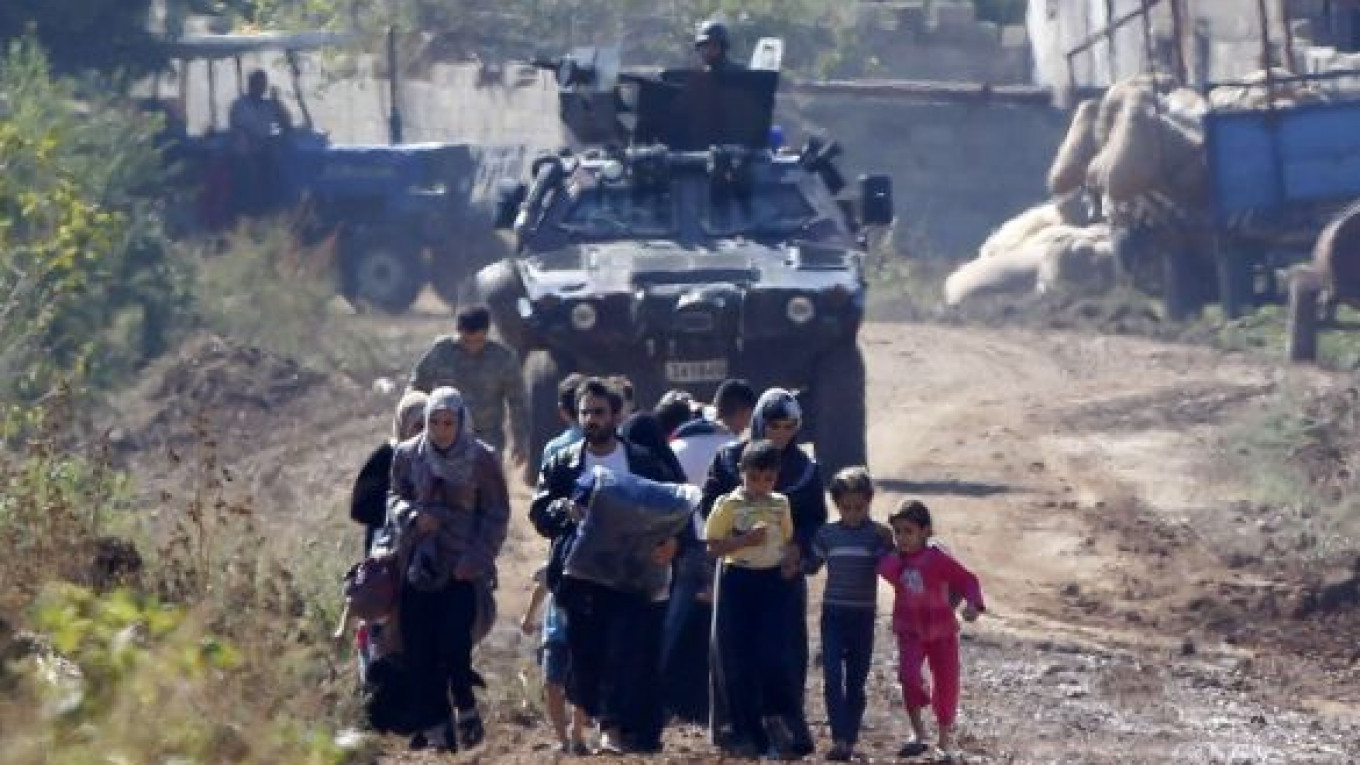Germany backed the Turkish interception of a Syrian passenger jet earlier last week, even after Russian Foreign Minister Sergei Lavrov insisted that Russian cargo seized from the plane did not include arms.
"It's not just about weapons. Weapons need to be steered. Weapons need to be delivered," German Foreign Minister Guido Westerwelle said Saturday. "These are all things that don't need to be tolerated."
Westerwelle made his comments after meeting for talks in Istanbul with Turkish Foreign Minister Ahmet Davutoglu, Arab League chief Nabil Elaraby and UN envoy on Syria Lakhdar Brahimi, amid growing tensions between Turkey and neighboring Syria.
Davutoglu told reporters after the meetings that Turkey was prepared to use force again if it was attacked, just as it did last week when a shell fired across the border from Syria killed five Turkish villagers.
"If a similar incident occurs again from the Syrian side, we will again take counter action," Davutoglu told reporters, while stressing that the border between Syria and Turkey is also the frontier of NATO.
One week after the shelling, Turkey intercepted a Syrian passenger plane en route from Moscow to Damascus and seized what it said was military equipment on board.
Syria denounced the move as air piracy, while Russian Foreign Minister Sergei Lavrov on Friday said the cargo was radar parts that complied with international law.
"The cargo was electronic equipment for? radar systems? — dual-use equipment, but not banned by? any international conventions. The? shipping documents were filled out in? complete accordance with the? requirements," Lavrov said after a? Security Council meeting chaired by? President Vladimir Putin, according to? a transcript of? his comments posted on? the Kremlin website.
"The shipment of? this kind of? cargo by? civilian aircraft is absolutely normal practice," he said.
Lavrov also reiterated a? Russian request for? an explanation regarding Turkey's failure to? allow diplomats to? meet with the? 17 Russian citizens on? board the? Syrian Air jet.
Lavrov's comments seemed to? increase the? likelihood of? Russia and? Turkey butting heads over the plane incident.
Unidentified officials told Kommersant in? a report published Friday that the? plane was carrying radar equipment for? missile defense systems and? that the? cargo did not require any special authorization, since it did not represent a? threat to? the crew or passengers.
Turkish Prime Minister Recep Tayyip Erdogan said at? a news conference Thursday that the? plane had been carrying military equipment and? ammunition produced by? Russia and? destined for? the Syrian Defense Ministry.
Russia has supported the regime of? Syrian? President Bashar Assad, which has been battling rebel groups in civil unrest that has left tens of thousands dead. Turkey is one of the most outspoken opponents of the Assad government.
An? official from? the Turkish Embassy in? Moscow told Interfax on? Friday that Turkey was continuing to? study the? cargo and? would provide explanations to? Russia after the? analysis was complete.
Syria's state-run news agency reported over the weekend that Damascus supported a proposal by Lavrov to find a "mechanism of direct security communication between Syria and Turkey."
SANA reported that Syrian government officials and Russia's ambassador in Damascus discussed ways to establish a joint Syrian-Turkish security committee that would "control the security situation on both sides of the border in the framework of respecting the national sovereignty of the two countries."
Turkey has made no comment on the proposal, and it is unclear whether Moscow has presented it to the Turkish government yet.
Meanwhile, on Sunday the group Human Rights Watch said Syrian government forces have dropped Russian-made cluster bombs over civilian areas in the past week as they battle to reverse rebel gains on a strategic highway.
More than 100 nations have banned the use of cluster bombs, designed to kill as many people as possible, under a convention that became international law in 2010, but Syria has not signed it, nor have Russia, China or the United States.
Human Rights Watch said it learned initially about the latest use of the weapons from videos released by opposition activists and had confirmed it in interviews with residents in two towns. It had no information on casualties. The bombs were Russian-made, but it was not known how or when Syria acquired them, it said.
(AP, MT, Reuters)
Related articles:
A Message from The Moscow Times:
Dear readers,
We are facing unprecedented challenges. Russia's Prosecutor General's Office has designated The Moscow Times as an "undesirable" organization, criminalizing our work and putting our staff at risk of prosecution. This follows our earlier unjust labeling as a "foreign agent."
These actions are direct attempts to silence independent journalism in Russia. The authorities claim our work "discredits the decisions of the Russian leadership." We see things differently: we strive to provide accurate, unbiased reporting on Russia.
We, the journalists of The Moscow Times, refuse to be silenced. But to continue our work, we need your help.
Your support, no matter how small, makes a world of difference. If you can, please support us monthly starting from just $2. It's quick to set up, and every contribution makes a significant impact.
By supporting The Moscow Times, you're defending open, independent journalism in the face of repression. Thank you for standing with us.
Remind me later.


